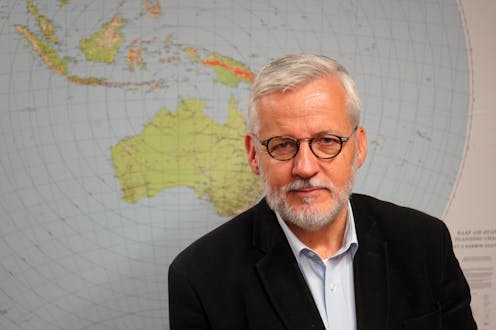John Blaxland on spies, AUKUS, and an unsettled Washington
- Written by Michelle Grattan, Professorial Fellow, University of Canberra

Last week, ASIO boss Mike Burgess gave his annual assessment of threats to Australia’s domestic security. In his speech, Burgess sensationally revealed that a former politician had “sold out their country” to a foreign regime.
Burgess’s refusal to name the person, citing the need to protect ASIO’s tradecraft, invited speculation and debate. Nor would he specify the country, but a subsequent report said it was China.
In this podcast, we’re joined by Professor John Blaxland, Professor of International Security & Intelligence Studies at the Australian National University. He was a co-author of the multi-volume history of ASIO; recently, he co-authored Revealing Secrets: An Unofficial History of Australian Signals Intelligence & the Advent of Cyber. Blaxland is currently the Director of the ANU’s North America Liaison Office.
On the issue of Burgess staying mum about the former politician’s identity, Blaxland says there is good reason for keeping it secret.
So there’s a question mark now, as to whether the […] nation involved actually knows how effective ASIO has been at disrupting, because […] one of the things that good espionage agencies do is they try and flip their targets so that they become a double agent.
On AUKUS, under criticism from some experts who argue the agreement won’t necessarily protect Australia because the Americans might step back from the region and its allies, Blaxland says:
The great irony, of course, is that’s half the reason why we’re doing this. We want this technology. We want all this kit. We want all this manufacturing capability onshore just in case they’re not going to come if we need them.
He’s very critical of Paul Keating, who this week attacked Foreign Minister Penny Wong and Canberra’s national security establishment.
What is interesting and a little bit unsettling, in my view, is the consistency with which Paul Keating slams our principal ally and major foreign direct investor and principal economic partner, let’s face it, the United States. And yet, screamingly silent when it comes to criticism of China.[…] And it’s Shakespearean even in terms of perhaps about the level of protest.
Based in Washington DC, Blaxland describes the atmosphere as the 2024 presidential election kicks into gear:
It’s an unhappy place. It’s a bit tense. People are worried about what the future might look like.
This is an overwhelmingly Democrat town. And, you know, President Trump’s talked about draining the swamp. And that’s a deeply, deeply unsettling prospect.
Authors: Michelle Grattan, Professorial Fellow, University of Canberra





